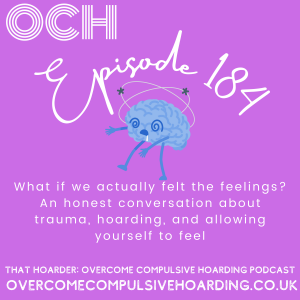
Friday May 02, 2025
#184 What if we actually felt the feelings? An honest conversation about trauma, hoarding, and allowing yourself to feel
- Come to a Dehoarding Accountability Zoom Session: http://www.overcomecompulsivehoarding.co.uk/ticket
- Subscribe to the podcast: https://www.overcomecompulsivehoarding.co.uk/subscribe
- Podcast show notes, links and transcript: http://www.overcomecompulsivehoarding.co.uk/
This week, I talk about what happens when I actually let myself feel the tough emotions instead of shutting them down - a pattern that's shaped my life and my struggles with hoarding, self-harm, and eating disorders. After a thought-provoking conversation with Anna Sale on Death, Sex & Money last year, I started questioning whether avoiding feelings has helped or hurt me in the long run and have been trying to process that ever since! I share what it’s like to sit with big emotions, experiment with messy ways to cope, and why feeling the feelings might just be a way forward.
- Avoiding Feelings
- Realisation that I tend to do anything rather than feel difficult emotions.
- Recent personal reflection and processing feelings over the past few months.
- Impact of mental health and a PTSD flare-up on my ability to manage feelings.
- Connecting Coping Mechanisms to Avoidance
- Experience with PTSD, self-harm, anorexia, and bulimia as different forms of not feeling or avoiding emotions.
- Insights from an interview with Anna Sale on Death, Sex & Money that linked these coping together as forms of avoidance.
- Acknowledgment that these strategies were more than just avoidance - also punitive, protective, and multifaceted.
- The Cost and Pattern of Emotional Avoidance
- Compartmentalising as a lifelong coping skill and its negative long-term consequences.
- Difficulty breaking the habit of not feeling and the impact on my sense of identity.
- Recognition that suppressing feelings can be as damaging as (or more damaging than) the feelings themselves.
- Actively Facing and Processing Feelings
- Engaging in therapy, journaling (both resentful and creative/collage style), and reading poetry to access emotions.
- Talking more openly with friends as a supportive measure.
- Forcing myself to do enjoyable activities (like getting outside), which helps counteract avoidance.
- Community, Connection, and Support
- Impact of Trauma and Suppression on Daily Life
- How PTSD and unprocessed sadness began affecting sleep, revealing that suppressing feelings is no longer effective.
- Discusses the challenge of letting oneself feel emotions, both by choice and when overcome involuntarily.
- The risks of being overwhelmed and the delicate balance between feeling and avoidance.
- Learning and Conversations About Emotional Acceptance
- Revisiting lessons from previous podcast guests about the counterproductivity of suppressing or over-intellectualising feelings.
- The concept that suppressed emotions may “come out sideways” through other behaviours, like self-harm or hoarding.
- Nuanced view of coping mechanisms - not labeling them as purely negative since they served protective purposes.
- Vulnerability, Shame, and Deepening Relationships
- Gradual willingness to share deeper, more distressing moments with friends.
- Examining the reasons behind the instinct to hide intense distress.
- How vulnerability leads to stronger, more meaningful connections.
- Positive Effects of Feeling the Hard Stuff
- Discovering that feeling hard emotions increases the capacity to feel positive emotions more deeply.
- Finding deeper love, joy, and beauty in everyday experiences.
- Recognising the importance of support systems when exploring difficult emotions.
- Reflection and Encouragement for Listeners
- Encourages listeners to be curious about their own patterns of avoidance and coping.
- Cautions that intentionally feeling emotions is difficult and requires support.
- The hopeful observation that allowing feelings can be cathartic, gratifying, and healing—even if it’s uncomfortable.
Links
- My interview on Death, Sex & Money
- Podcast ep 182: What are “towards and away moves” and what on earth do they have to do with hoarding recovery? With Dr Jan Eppingstall
- Podcast ep 169: Compassion-focused therapy for grief and hoarding with Dr Chia-Ying Chou
- Podcast ep 172: Harriet Impey on clearing out her parents’ very full home, through family belongings and personal growth, in the film Where Dragons Live
- Declutter Hub podcast
- Come to a Dehoarding Accountability Zoom session: Accountability Booking Form
- Website: Overcome Compulsive Hoarding
- Become a Dehoarding Darling
- Submit a topic for the podcast to cover
- Questions to ask when dehoarding: https://www.overcomecompulsivehoarding.co.uk/podquestions
- Instagram: @thathoarderpodcast
- Twitter: @ThatHoarder
- Mastodon: @ThatHoarder@mastodon.online
- TikTok: @thathoarderpodcast
- Facebook: Overcome Compulsive Hoarding with That Hoarder
- Pinterest: That Hoarder
- YouTube: Overcome Compulsive Hoarding with That Hoarder
- Reddit: Overcome Compulsive Hoarding with That Hoarder subreddit
- Help out: Support this project
- Sponsor the podcast
No comments yet. Be the first to say something!